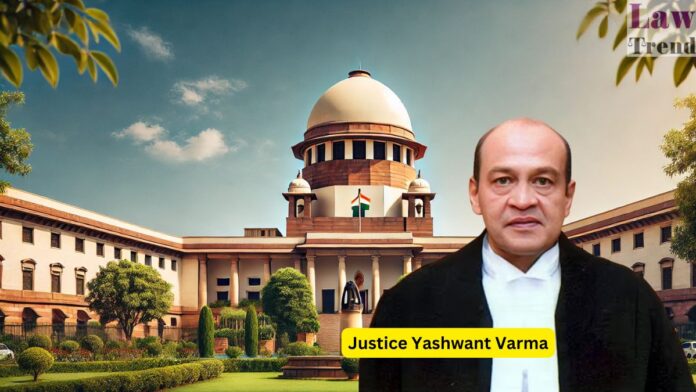The Supreme Court on Monday came down strongly on Justice Yashwant Varma of the Allahabad High Court for filing a petition challenging the findings of an in-house inquiry committee and the recommendation by former Chief Justice of India Sanjiv Khanna for his removal, following the alleged recovery of unaccounted cash from his official residence in Delhi.
A bench of Justices Dipankar Datta and A.G. Masih expressed serious reservations about the maintainability of the petition, remarking pointedly, “This petition should not have been filed.”
Background
Justice Varma moved the top court seeking a declaration that the recommendation made by ex-CJI Khanna for his removal was unconstitutional and ultra vires. The case stems from a fire incident at his official residence on March 14, 2025, during which fire officials reportedly found large quantities of unaccounted cash. A video of burning cash bundles surfaced shortly thereafter, triggering allegations of corruption.
Following this, CJI Khanna initiated an in-house investigation, constituting a three-judge panel comprising Chief Justice Sheel Nagu (Punjab and Haryana High Court), Chief Justice G.S. Sandhawalia (Himachal Pradesh High Court), and Justice Anu Sivaraman (Karnataka High Court). The panel began its probe on March 25 and submitted its report on May 3, which was forwarded to the President of India with a recommendation for Justice Varma’s removal.
Justice Varma was sent back to the Allahabad High Court, though judicial work was withdrawn from him on the CJI’s directions.
Justice Varma’s Arguments
Appearing for Justice Varma, senior advocate Kapil Sibal contended that:
- The in-house inquiry was initiated without any formal complaint, making the process invalid.
- The publication of allegations and press statements by the top court violated constitutional safeguards by subjecting the judge to a “media trial.”
- He was not given notice of the procedure adopted by the committee nor any opportunity to contest the evidence.
- “If cash is found in the outhouse, the question is—who does it belong to? How can it be attributed to me?” Sibal submitted.
- Referring to constitutional provisions, he argued that “such discussions on the conduct of a judge cannot take place even in Parliament unless misbehaviour is proven.”
- He alleged that Justice Varma was pressured to resign or retire within an “unduly restricted timeline” by CJI Khanna under the threat of initiating removal proceedings.
Court’s Observations
The bench raised several pointed questions:
- Justice Dipankar Datta asked, “Why did you appear before the inquiry committee if you believed the procedure was flawed? You should have come to court then and there and sought relief.”
- On the nature of the relief sought, Justice Datta said, “The first party in your plea is the Registrar General of the Supreme Court. Effectively, your grievance is against the Supreme Court itself. We don’t expect senior counsel to overlook something as basic as the cause title.”
- The bench repeatedly pressed Sibal to confine arguments within the “four corners of law” and refused to entertain documents not part of the record. “If you want to argue on the report, it must be on record,” Justice Datta said.
- On the procedural fairness of the inquiry, Justice Datta remarked, “It is one thing to say the procedure was transgressed and another to say that it was not followed. The sanctity of the procedure has been upheld. The recommendation is only for initiation of proceedings.”
- When Sibal invoked Article 124(4) and 124(5) of the Constitution to argue that only Parliament could discuss a judge’s conduct, the court countered, “It does not say the inquiry committee cannot look into it.”
The bench has scheduled the matter for further hearing on Wednesday and directed the petitioner’s counsel to file a revised memo of parties and a summary of key points.




